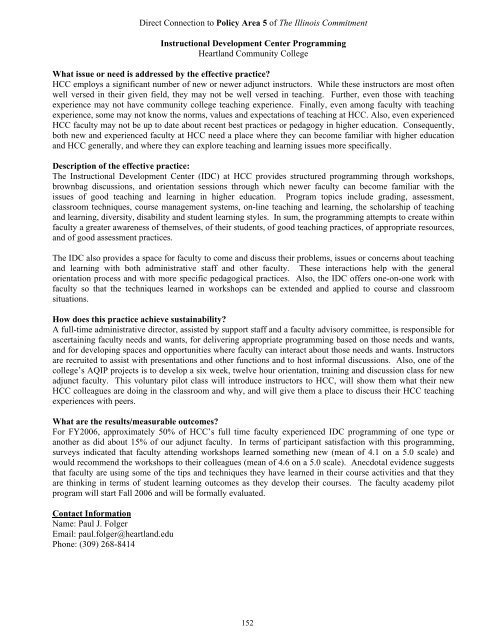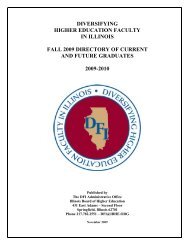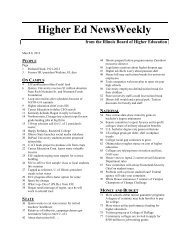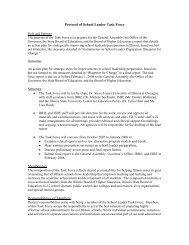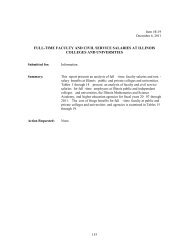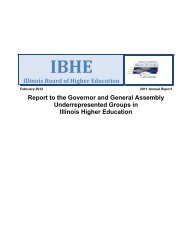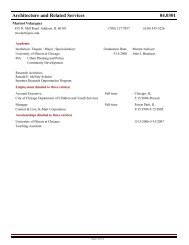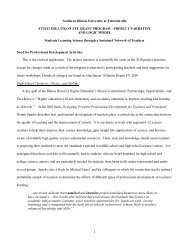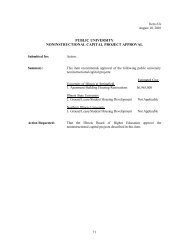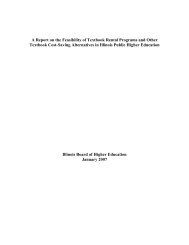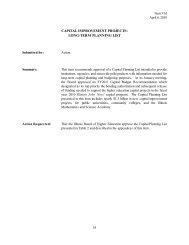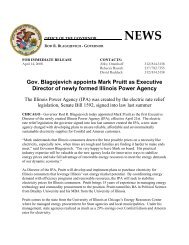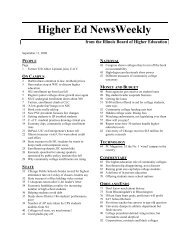Title of Effective Practice: - California Postsecondary Education ...
Title of Effective Practice: - California Postsecondary Education ...
Title of Effective Practice: - California Postsecondary Education ...
Create successful ePaper yourself
Turn your PDF publications into a flip-book with our unique Google optimized e-Paper software.
Direct Connection to Policy Area 5 <strong>of</strong> The Illinois Commitment<br />
Instructional Development Center Programming<br />
Heartland Community College<br />
What issue or need is addressed by the effective practice?<br />
HCC employs a significant number <strong>of</strong> new or newer adjunct instructors. While these instructors are most <strong>of</strong>ten<br />
well versed in their given field, they may not be well versed in teaching. Further, even those with teaching<br />
experience may not have community college teaching experience. Finally, even among faculty with teaching<br />
experience, some may not know the norms, values and expectations <strong>of</strong> teaching at HCC. Also, even experienced<br />
HCC faculty may not be up to date about recent best practices or pedagogy in higher education. Consequently,<br />
both new and experienced faculty at HCC need a place where they can become familiar with higher education<br />
and HCC generally, and where they can explore teaching and learning issues more specifically.<br />
Description <strong>of</strong> the effective practice:<br />
The Instructional Development Center (IDC) at HCC provides structured programming through workshops,<br />
brownbag discussions, and orientation sessions through which newer faculty can become familiar with the<br />
issues <strong>of</strong> good teaching and learning in higher education. Program topics include grading, assessment,<br />
classroom techniques, course management systems, on-line teaching and learning, the scholarship <strong>of</strong> teaching<br />
and learning, diversity, disability and student learning styles. In sum, the programming attempts to create within<br />
faculty a greater awareness <strong>of</strong> themselves, <strong>of</strong> their students, <strong>of</strong> good teaching practices, <strong>of</strong> appropriate resources,<br />
and <strong>of</strong> good assessment practices.<br />
The IDC also provides a space for faculty to come and discuss their problems, issues or concerns about teaching<br />
and learning with both administrative staff and other faculty. These interactions help with the general<br />
orientation process and with more specific pedagogical practices. Also, the IDC <strong>of</strong>fers one-on-one work with<br />
faculty so that the techniques learned in workshops can be extended and applied to course and classroom<br />
situations.<br />
How does this practice achieve sustainability?<br />
A full-time administrative director, assisted by support staff and a faculty advisory committee, is responsible for<br />
ascertaining faculty needs and wants, for delivering appropriate programming based on those needs and wants,<br />
and for developing spaces and opportunities where faculty can interact about those needs and wants. Instructors<br />
are recruited to assist with presentations and other functions and to host informal discussions. Also, one <strong>of</strong> the<br />
college’s AQIP projects is to develop a six week, twelve hour orientation, training and discussion class for new<br />
adjunct faculty. This voluntary pilot class will introduce instructors to HCC, will show them what their new<br />
HCC colleagues are doing in the classroom and why, and will give them a place to discuss their HCC teaching<br />
experiences with peers.<br />
What are the results/measurable outcomes?<br />
For FY2006, approximately 50% <strong>of</strong> HCC’s full time faculty experienced IDC programming <strong>of</strong> one type or<br />
another as did about 15% <strong>of</strong> our adjunct faculty. In terms <strong>of</strong> participant satisfaction with this programming,<br />
surveys indicated that faculty attending workshops learned something new (mean <strong>of</strong> 4.1 on a 5.0 scale) and<br />
would recommend the workshops to their colleagues (mean <strong>of</strong> 4.6 on a 5.0 scale). Anecdotal evidence suggests<br />
that faculty are using some <strong>of</strong> the tips and techniques they have learned in their course activities and that they<br />
are thinking in terms <strong>of</strong> student learning outcomes as they develop their courses. The faculty academy pilot<br />
program will start Fall 2006 and will be formally evaluated.<br />
Contact Information<br />
Name: Paul J. Folger<br />
Email: paul.folger@heartland.edu<br />
Phone: (309) 268-8414<br />
152


